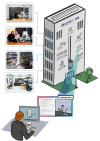| Both sides previous revisionPrevious revision | Next revisionBoth sides next revision |
| research [2023/08/14 13:44] – [Collaborative Projects] cstoess | research [2023/08/14 14:22] – [Collaborative Projects] cstoess |
|---|
| ^ {{:logo-ease-2019.png?nolink&200|}} ^**[[http://www.ease-crc.org|EASE]]** (SFB 1320) is a collaborative research center. EASE will investigate the design, realization, and analysis of information processing models that enable robotic agents (and humans) to master complex human-scale manipulation tasks that are mundane and routine. EASE not only investigates action selection and control but also the methods needed to acquire the knowledge, skills, and competence required for flexible, reliable, and efficient mastery of these activities.^ | ^ {{:logo-ease-2019.png?nolink&200|}} ^**[[http://www.ease-crc.org|EASE]]** (SFB 1320) is a collaborative research center. EASE will investigate the design, realization, and analysis of information processing models that enable robotic agents (and humans) to master complex human-scale manipulation tasks that are mundane and routine. EASE not only investigates action selection and control but also the methods needed to acquire the knowledge, skills, and competence required for flexible, reliable, and efficient mastery of these activities.^ |
| ^ [[https://intel4coro.ai.uni-bremen.de|{{:kinect2_raw_nocalib.png?200|}}]] ^**[[https://intel4coro.ai.uni-bremen.de|IntEL4CoRo]]** designs and develops an immersive learning environment for Cognitive Robotics and AI. Based on the AVIVA model and a conceptual framework, coherent learning opportunities and materials will be developed.^ | ^ [[https://intel4coro.ai.uni-bremen.de|{{:kinect2_raw_nocalib.png?200|}}]] ^**[[https://intel4coro.ai.uni-bremen.de|IntEL4CoRo]]** designs and develops an immersive learning environment for Cognitive Robotics and AI. Based on the AVIVA model and a conceptual framework, coherent learning opportunities and materials will be developed.^ |
| ^ {{:projects:remaro.png?nolink&200|}} ^The REMARO project addresses the challenge of the development of a reliable AI system that can act on new underwater activities. The goal is to design brains for robots that enable robots to act safely while allowing them to improve by self-learning. Three project partners are from Bremen: DFKI, ROSEN Group, and the Institute of Artificial Intelligence at the University of Bremen.^ | ^ {{:projects:remaro.png?nolink&200|}} ^The **[[https://remaro.eu/|REMARO]]** project addresses the challenge of the development of a reliable AI system that can act on new underwater activities. The goal is to design brains for robots that enable robots to act safely while allowing them to improve by self-learning. Three project partners are from Bremen: DFKI, ROSEN Group, and the Institute of Artificial Intelligence at the University of Bremen.^ |
| ^ {{:projects:ki-campus_logo_mitimprover_blau.png?nolink&200|}} ^**[[http://improver.uni-bremen.de/|IMPROVER]]** develops a MOOC covering the most important aspects and techniques for designing and implementing cognition-enabled robot agents. ^ | ^ {{:projects:ki-campus_logo_mitimprover_blau.png?nolink&200|}} ^**[[http://improver.uni-bremen.de/|IMPROVER]]** develops a MOOC covering the most important aspects and techniques for designing and implementing cognition-enabled robot agents. ^ |
| ^ {{:research:logo_sfbfz.png?200|}} ^ The initiative **[[https://www.uni-bremen.de/farbige-zustaende.html|Farbige Zustände]]** aims at the development of a novel experimental method for developing metallic structural materials. The goal is the efficient and targeted identification of compositions and process chains that lead to a specific performance profile of the material. Conventional material developments are based on costly experimental investigations of chemical, mechanical, or technological material properties. The IAI uses AI and machine learning methods to predict material properties based on relationships extracted from experimental data and semantic knowledge. ^ | ^ {{:research:logo_sfbfz.png?200|}} ^ The initiative **[[https://www.uni-bremen.de/farbige-zustaende.html|Farbige Zustände]]** aims at the development of a novel experimental method for developing metallic structural materials. The goal is the efficient and targeted identification of compositions and process chains that lead to a specific performance profile of the material. Conventional material developments are based on costly experimental investigations of chemical, mechanical, or technological material properties. The IAI uses AI and machine learning methods to predict material properties based on relationships extracted from experimental data and semantic knowledge. ^ |












